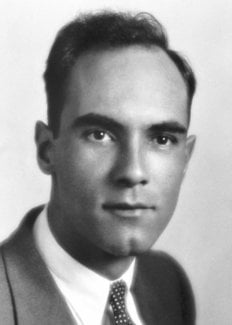Carl D. Anderson
Biographical

Carl David Anderson, who was born of Swedish parents – his father was Carl David Anderson and his mother Emma Adolfina Ajaxson – in New York City (USA) on 3rd September, 1905, has spent the bulk of his life in the United States. He graduated from the California Institute of Technology in 1927 with a B.Sc. degree in Physics and Engineering, and was awarded his Ph.D. degree by the same Institute, in 1930. For the period 1930-1933 he was Research Fellow there, subsequently (1933) Assistant Professor of Physics, and Professor of Physics (1939) During the war years (1941-1945) he was also active on projects for the National Defence Research Committee and the Office of Scientific Research and Development.
His early researches were in the field of X-rays. For his doctoral thesis he studied the space distribution of photoelectrons ejected from various gases by X-rays. In 1930, with Professor Millikan, he began his cosmic-ray studies which led in 1932 to the discovery of the positron. He has studied the energy distribution of cosmic-ray particles and the energy loss of very high speed electrons in traversing matter. In 1933 he and Dr. Neddermeyer obtained the first direct proof that gamma rays from ThC” generate positrons in their passage through material substances. Since 1933 he has continued his work on radiation and fundamental particles. Most of Anderson’s researches and discoveries have been published in The Physical Review and Science.
Among the scientific honours bestowed upon him, in addition to the Nobel Prize, may be mentioned the following: Gold Medal of the American Institute of City of New York (1935); Sc.D. of Colgate University (1937); Elliott Cresson Medal of the Franklin Institute (1937); Presidential Certificate of Merit (1945); LL.D. Temple University (1949); John Ericsson Medal of the American Society of Swedish Engineers (1960).
In 1946 Anderson married Lorraine Bergman; they have two sons, Marshall and David.
This autobiography/biography was written at the time of the award and first published in the book series Les Prix Nobel. It was later edited and republished in Nobel Lectures. To cite this document, always state the source as shown above.
Carl D. Anderson died on January 11, 1991.
Nobel Prizes and laureates
Six prizes were awarded for achievements that have conferred the greatest benefit to humankind. The 12 laureates' work and discoveries range from proteins' structures and machine learning to fighting for a world free of nuclear weapons.
See them all presented here.
